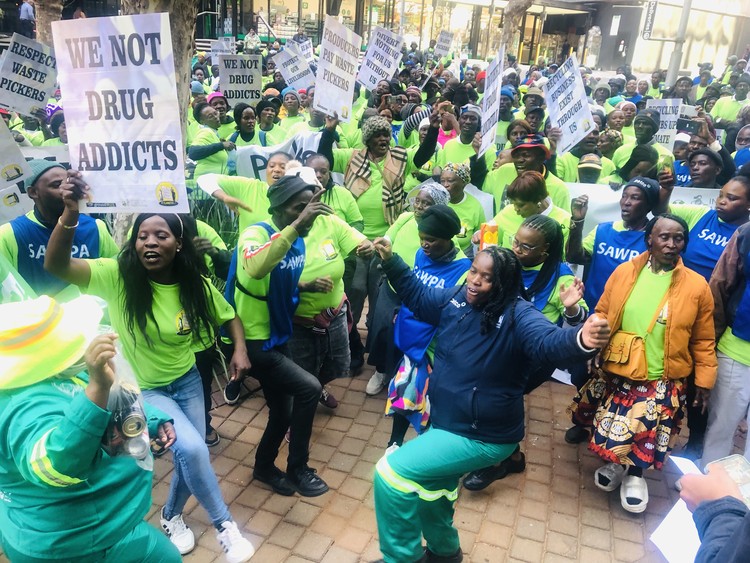
7 August 2024
Waste pickers affiliated to the South African Waste Pickers Association (SAWPA) marched to the City of Johannesburg offices in Braamfontein on Tuesday to demand compensation for collecting recyclables and to oppose plans to incinerate waste. Photos: Kimberly Mutandiro
Over 200 waste pickers affiliated to the South African Waste Pickers Association (SAWPA) marched from Mary Fitzgerald Square to the City of Johannesburg offices in Braamfontein on Tuesday.
The marchers claim they represent more than 10,000 registered waste pickers and between 100,000- 200,000 waste pickers who work at landfill sites or on the streets across the country.
They are calling for the City to halt plans to incinerate collected waste. They say this plan threatens the livelihoods of waste pickers. They also want to be compensated.
They are calling for the Extended Producer Responsibility Scheme to be implemented. They say this legislation provides for waste pickers to be compensated for collecting recyclables such as cans, plastic and cardboard, through a levy charge on the companies that produce this waste.
According to Lefa Mononga, SAWPA Coordinator, the government launched the Extended Producer Responsibility Scheme in 2021, as a five-year project to give people enough time to organise and register under the South African Waste pickers registration system. This was also meant to be part of plans to compensate them for collecting recyclable waste. But no payments have been made to date, said Mononga.
The waste pickers also opposed a City-proposed site which plans to incinerate waste.
SAWPA also wants the City to implement zero-waste projects that can create more jobs. Other demands included that the Department of Forestry, Fisheries, and Environment implement Extended Producer Responsibility Scheme regulations, and to engage over levies collected from companies, among other things.
Representatives from the City and department accepted the group’s memorandum.
Nomalizo Ntsizana has been a waste picker for ten years. She said: “Waste Picking is important for the climate and environment, yet we don’t have access to protective clothing like gloves, which makes us vulnerable to diseases. We want the government to give us motorbikes, protective clothing, and trolleys to make our job easier.”
Nonhlanhla Nqobo from Pietermaritzburg said she has been struggling to survive after landfills in her area closed down three years ago. She now survives on picking up material from the streets. It takes months to collect enough material to sell. “All we want is for the government to recognize our work. All we want is to be able to look after our children,” she said.
The South African Waste Pickers Association wants the City of Johannesburg to implement zero-waste projects that can create more jobs.